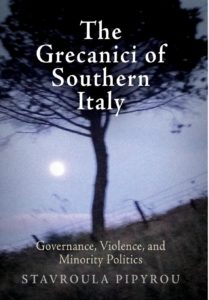
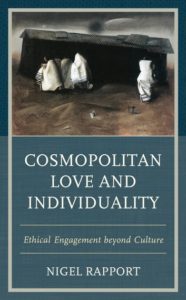
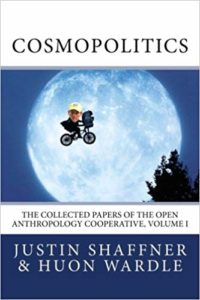
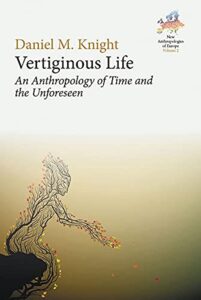
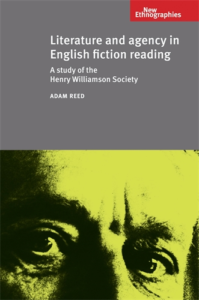
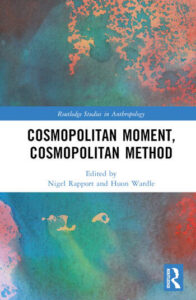
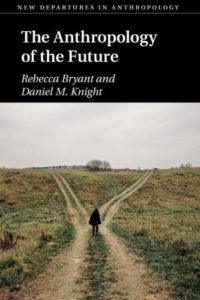
ST ANDREWS MEMBERS:
Daniel M. Knight (CCS Director) writes on philosophical, historical and economic anthropology, with a focus on temporality and crisis in the context of Greece. He has published
monographs Vertiginous Life: An Anthropology of Time and the Unforeseen (2021), The Anthropology of the Future (2019) and History, Time, and Economic Crisis in Central Greece (2015). Daniel has edited collections on Porous Becomings: Anthropological Engagements with Michel Serres (2024) and Ethnographies of Austerity: Temporality, Crisis and Affect in Southern Europe (2017). His work is framed by ‘philosophy of humanity’ perspectives, from Kierkegaard and Sartre, to Aristotle, Heidegger, and Serres. He has special journal collections on “Polycrisis” (2023), “The Vertiginous: Temporalities and Affects of Social Vertigo” (2022), “Emptiness” (2020), “Orientations to the Future” (2018), “Alternatives to Austerity” (2017) and “Ethnographies of Austerity” (2016). Daniel is co-editor of History and Anthropology journal.
Mattia Fumanti has research interests in colonial and postcolonial Africa, the anthropology of migration and medical anthropology. His work in Namibia, Ghana and the African diaspora focuses on post-apartheid political transformations in urban contexts, youth, inter-generational relations and popular culture; elites, distinction and education; mental health; masculinities and gender; ethics, morality and the making of the public space. He is author of Religion and Transnational Citizenship in the African Diaspora: Akan London (2023) and The Politics of Distinction: African Elites from Colonialism to Liberation in a Namibian Frontier Town (2016).
Paloma Gay y Blasco writes on gender, minorities, and collaborative methods, attempting to find ways to make anthropology more accessible to the lives of the people they study. She has worked extensively on Romani issues, but also on ageing, wellbeing and the good life, COVID-19, the oppression of minorities by the state, gender and sex, women’s lives, migration, religion and kinship. She is author of Gypsies in Madrid: Sex, Gender and the Performance of Identity (1999), co-editor of Romani Chronicles of COVID-19: Testimonies of Harm and Resilience (2023) and How to Read Ethnography (2007/2019), and co-author of Writing Friendship: A Reciprocal Ethnography (2020).
Stavroula Pipyrou writes on minority governance, publishing a monograph The Grecanici of Southern Italy: Governance, Violence, and Minority Politics (2016) where she presents a theory of “Fearless Governance”. Her recent three-year Leverhulme project, “An Intergenerational Analysis of Forced Child-relocation in Italy”, looked at the silenced stories of displacement in Cold War (1950s) South Italy shedding light on a hitherto overlooked historico-political period of turmoil. Stavroula has also published on irony, secondhand clothes markets and civil society (Italy) as well as dance, performance, Pontian refugee identity, and death (Greece). Stavroula is the Founding Director of the Centre for Minorities Research at St
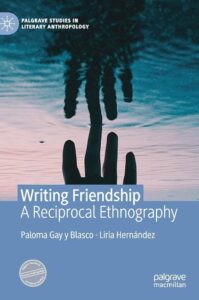 Andrews, an interdisciplinary platform aimed at comprehensively researching the complex challenges facing minorities in Scotland and beyond.
Andrews, an interdisciplinary platform aimed at comprehensively researching the complex challenges facing minorities in Scotland and beyond.
Nigel Rapport has been interested in cosmopolitanism as a form of global liberalism, that is, as a form of political and moral philosophy which recognises the universal existence of the individual human actor –‘Everyone’–and their rights to freedom of expression, conscience, world-view and life-project. Cosmopolitanism offers an emancipation from the ‘despotism of custom’, to borrow John Stuart Mill’s phrasing, and holds out the promise that the individual might be the author of his or her identity, free from the histories, traditions, classificatory schema, cosmologies, revelatory claims, and politicking of cultural communities. Nigel is author/editor of 26 books, many of which are on aspects of cosmopolitanism, including The Routledge International Handbook of Existential Human Science (2023), Cosmopolitan Love and Individuality: Ethical Engagement beyond Culture (2018), Anyone: The Cosmopolitan Subject of Anthropology (2012), and I Am Dynamite: An Alternative Anthropology of Power (2003).
Adam Reed has written on interpreting personality in London (JRAI, 2002), men’s fiction writing (Ethnos 2002, American Ethnologist 2004), and the anthropology of character (special section of Social Anthropology 2018, PMLA 2019). He is author of Literature and Agency in English Fiction Reading (2011) and Papua New Guinea’s Last Place: Experiences of Constraint in a Postcolonial Prison (2003).
Huon Wardle‘s work has been centrally concerned with developing cosmopolitanism as a theme in anthropological inquiry. This includes writing on Kantian Common Sense, on imaginative extraterritoriality, on the ethnography of cosmopolitanism and on the meaning of cultural openness as a subjective and socio-cultural phenomenon. In 2014 Huon won the Royal Anthropological Institute’s J.B. Donne Prize for his essay ‘The Artist Carl Abrahams and the Cosmopolitan Work of Centring and Peripheralising the Self’. He is co-editor of numerous edited collections, including Cosmopolitics: The Collected Papers of the Open Anthropology Cooperative (2017), Freedom in Practice: Governance, Autonomy and Liberty in the Everyday (2017), and How to Read Ethnography (2007/2019). Most recently, Huon has co-edited Cosmopolitan Moment, Cosmopolitan Method (2024) and The Routledge International Handbook of Existential Human Science (2023).
Recent Special Collections from CCS Events
Anthropological Forum journal: A special collection on ‘Cosmopolitan Networks’ in Anthropological Forum journal to be published in 2024. The publication stems from a 2019 workshop at the Norwegian University of Science and Technology, organized by CCS Visiting Professor, Jan Ketil Simonsen and Professor Lorenzo Canas Bottos (both Norwegian University of Science and Technology). CCS authors in the collection are Dr Daniel M. Knight, Professor Nigel Rapport and Dr Huon Wardle, as well as former University of St Andrews student and CCS Research Associate, Shuhua Chen.
Cultural Anthropology journal: A special collection on ‘Emptiness’ in Cultural Anthropology journal’s ‘Theorizing the Contemporary’ section (2020). The publication stems from the 2019 workshop at Oxford University, organized by CCS Research Associate, Dr Dace Dzenovska (Oxford University) and CCS Director, Daniel M. Knight. CCS authors in the collection are Dr Daniel M. Knight, Professor Christos Lynteris, Ms Gabriela Manley, and CCS Research Associate, Dr David Henig.
American Ethnological Society: A special collection of the American Ethnological Society on ‘Orientations to the Future‘ (2019). The publication stems from the 2018 CCS conference at the University of St Andrews, organized by CCS Director, Daniel M. Knight. CCS authors in the collection are Dr Daniel M. Knight, Professor Nigel Rapport, and CCS Research Associate Professor Rebecca Bryant, who also delivered the 2018 CCS Keynote Lecture, as well as CCS Visiting Professor, Professor Morten Nielsen. The special issue was used to help launch the 2019 annual American Ethnological Society conference on ‘Ethnographic Futures‘, held in St Louis, Missouri, USA.
Social Anthropology journal: A special collection split over 2 issues of Social Anthropology journal on ‘Anthropology and Character’ (2018), stemming from a 2016 Ladislav Holy Memorial Trust / CCS conference held at the University of St Andrews and organized by Dr Adam Reed. CCS contributors were Dr Adam Reed, Dr Huon Wardle, and CCS Visiting Professor, Morten Axel Pedersen.

